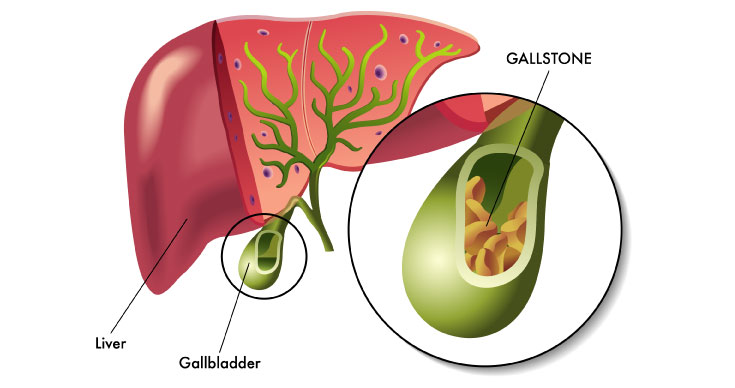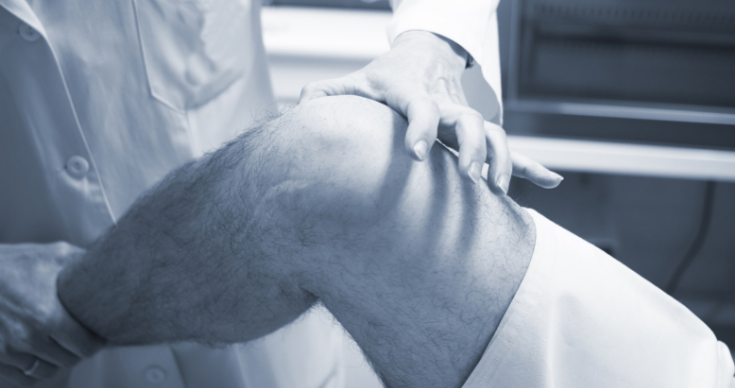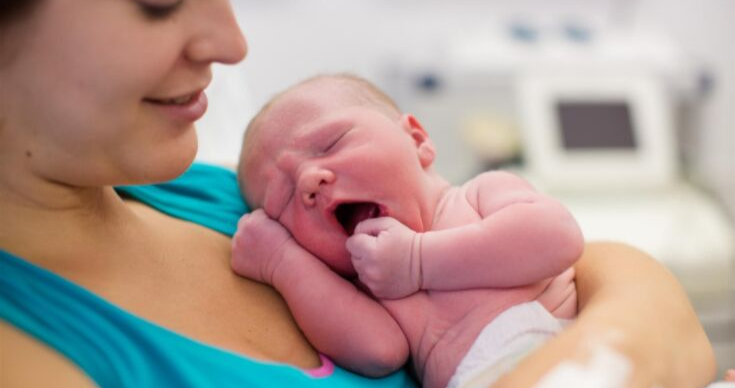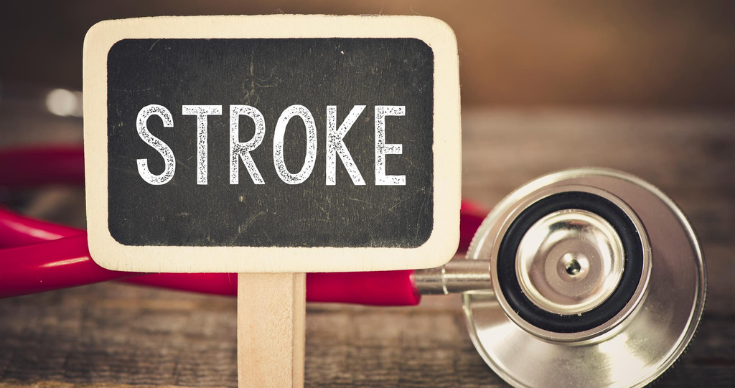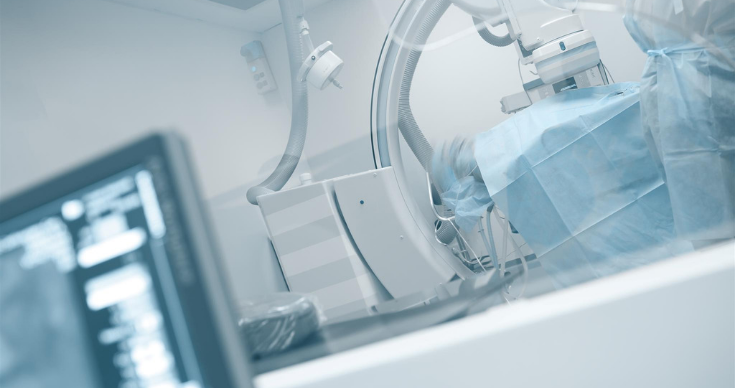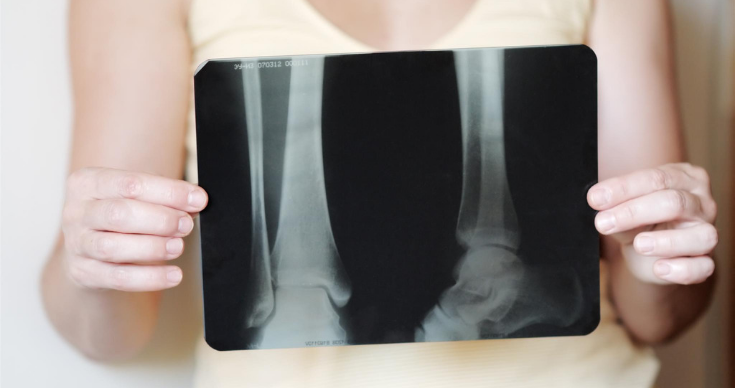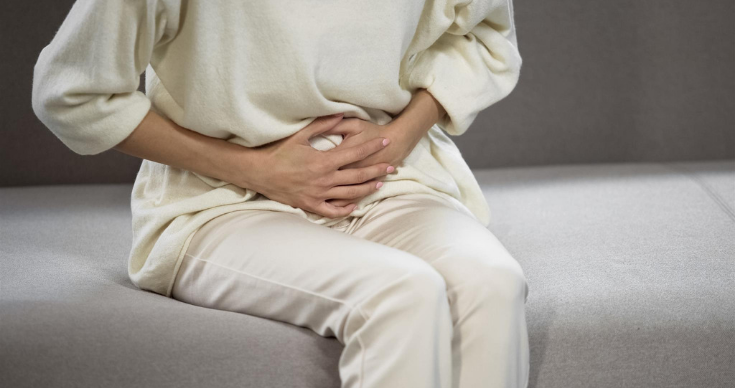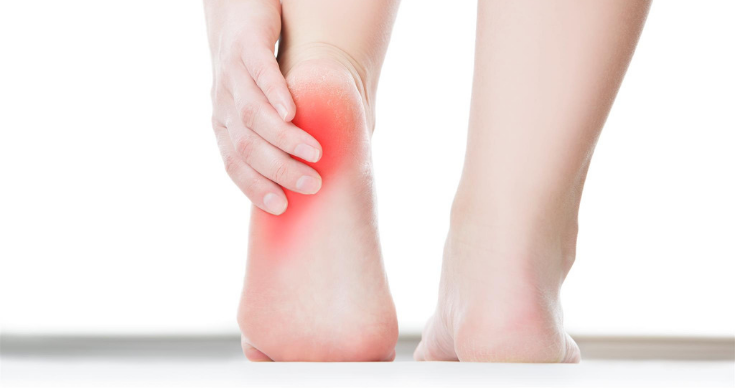A Brief Introduction To Gallstones And Gallstone Surgery
The gallbladder is a pear-shaped organ, located in the upper right side of the abdomen, right under the liver. It secretes bile juice, which helps in digestion. When this digestive enzyme solidifies, it forms hard, gallstones. Gallstones are of 2 types, cholesterol stones (when too much cholesterol is present in the bile) and pigment stones (when too much bilirubin is present in the bile). It is becoming very common these days and thus, a lot of hospitals are offering gallbladder stone surgery. Let’s understand some important aspects of the same, in details.
Symptoms Of Gallstones
Gallstones can arise in any number or size. Thus, the exact symptoms vary greatly from person to person. Many a time, gallstones might not project any symptoms at all (known as silent gallstones). However, the most common symptoms of gallstones are as follows and can persist anywhere between a few minutes to a few hours-
- Intense pain in the middle abdomen
- Pain in the right upper abdomen
- Pain in the right shoulder or between shoulder blades
- Nausea and vomiting
Though these symptoms can arise due to other conditions as well, if it persists for more than 2-3 weeks, it is best to get it evaluated to know the exact reason.
Causes Of Gallstones
Gallstones can happen to anyone. But few risk factors uplift the chances very much. These include-
- Having a family history of gallstones
- Having a personal history of gallstones
- Being overweight or obese
- Being pregnant
- Being 40 years or more
- Being female
- Being on a crash diet for weight loss
- Eating too spicy/oily food
- Eating a low-fiber diet
- Leading a sedentary lifestyle
- Having high cholesterol
- Having liver diseases
- Having diabetes
- Losing weight rapidly
- Taking medicines containing estrogen (like oral contraceptives)
It is important to evaluate oneself whether or not they are at risk of having gallstones. As a preventive measure, losing weight slowly, maintaining healthy body weight, and leading a healthy lifestyle is helpful to reduce the chances of the same.
What Is The Treatment For Gallstones?
If gallstones are left untreated, these can lead to complications such as inflammation of the gallbladder, blockage of common bile duct/ pancreatic bile duct and rarely gallbladder cancer. Thus, it is crucial to seek treatment for it, on time.
Gallstones can be treated by oral medication, shock wave lithotripsy and gallbladder stone surgery. Oral medical and litho stock therapy removes the stones by dislodging them, but often it takes many years to treat it completely if there are many gallstones. Moreover, once the therapy or the medication stops, the gallstones recur and for some people, the therapy or medicines simply don’t work.
Thus gallbladder surgery often remains the only option to treat gallstones permanently. In this surgery, the gallbladder is removed altogether so that gallstone can never recur in the future. These days, many doctors offer laparoscopic gallstone surgery, which removes the gallstones (along with the gallbladder, if needed) through few minute incisions and thus offers many advantages over open gallstone surgery.
The suitable method of treatment is determined by the doctor, depending upon your symptoms, complication, and compatibility. Come at ILS Hospitals for consultation and to get safe and effective gallbladder stone surgery from highly skilled GI surgeons.
Reasons For Considering Joint Replacement Surgery
Do you often complain of joint pain, especially of hips and knees? Your pain medicines are not working anymore? Then perhaps it is time for you to consider for a more reliable treatment for the same. Orthopedic clinics often find people approaching them with a complaint of intolerable pain and discomfort. At some point, it becomes an utter necessity to operate at the earliest convenience.
So, today we offer some tips on how to determine when you should consider getting joint replacement surgery. Though the symptoms and difficulties might vary from person to person, the following symptoms usually remain the same.
1. Joint Pain That Keeps You Up At Night
Several times the joint pain becomes more intense during the night as compared to the day time. So, in case your joint pain becomes more intense at night that wakes you up or makes it difficult for you to fall asleep, its time for you to consider joint replacement surgery.
2. You Feel Pain While Taking Stairs
In case you are avoiding stairs as much as you can because of joint pain, you should pay more attention to it. Climbing stairs exert more strain of the joint as compared to walking on plains. Now every individual will be tired to climb too many stairs, but you should seek the medical opinion if you are experiencing pain, even for a climb of 4-5 stairs.
3. You Have Trouble Getting Up
Do you find it difficult to stand up easily, every time you sit on the floor or chair or even on the bed? You might experience pain in either one or both legs (ankle, heel, knee anywhere) and need some support to balance yourself. This is yet another alarming sign that indicates you to consider the joint replacement surgery.
4. You Have Trouble Walking
This is a severe case which usually happens if the knee pain is chronic. In simple words it means, this stage arises only when you ignore your everyday pain and discomfort for a long period. You might even be limping a little from time to time and swelling around the joints is quite common as well. Consider permanent cure immediately if rest or medicine does not work.
5. Pain That Affects Your Everyday Life
In case having a repetitive episode of pain is stopping you from doing your routine work; like going to the grocery, to the workplace or a park nearby, it is a big issue that needs to be addressed as soon as possible. If left untreated, the thing will become worse.
6. Your Pain Management Or Medication Is No Longer Working
Applying ointment, hot water bags, tieing up crepe bandages and drinking hot milk might work for a short period, but they are not the solution for joint pain in severe cases. Moreover, for many, even the over-the-counter drugs aren’t that effective either. It is recommended to consider surgery for such individuals.
Joint replacement surgeries work wonders if they are availed from experts of some good orthopedic clinics. It not only helps to get relief but also improves mobility that contributes towards making a healthy living ahead. In case you too are suffering from the same, come at ILS Hospitals to seek consultation from expert orthopedics and avail joint replacement surgery.
Diabetes And Its Harmful Effects On Overall Health
Diabetes is a medical condition which is becoming so prevalent around us these days. Until 2-3 decades ago, it was considered to be the old people’s disease, but now, young people are also seeking diabetes treatment. Many diabetes clinics, report having young children falling prey for diabetes as well. Let’s discuss what harmful effects diabetes has if it is left untreated for long or is poorly managed.
1. Slow Healing
Slow healing is the most common condition among diabetic people. Carrying out any invasive medical treatment is very challenging for the same reason. Any minor or major cut, burn, blister, etc does not heal quickly for the diabetic patients. This mostly happens in hands and feet. In rare cases, it can also lead to foot or toe amputation, when it is left untreated over a long period.
2. Kidney Damage
Having kidney failure or severe kidney disease is also a likely scenario in the case of diabetes. The patient might end up needing dialysis regularly or seeking advanced renal transplant.
3. Heart Conditions
Diabetes affects how the heart and its surrounding blood vessels work. As a result, risks of having high blood pressure narrowed blood vessels due to plaque built up is quite common too.
4. Eye Disease And Damage
Diabetes brings many vision-related complications as well. Cataract, glaucoma, eye nerve damage, etc. are some of them. In many cases, it can also lead towards blindness that can only be managed but cannot be cured.
5. Skin Diseases
Diabetes cause dry skin, skin irritation, itching, and many other complications. Moreover, slow healing often leads to cracked skin which in turn brings fungal and bacterial infections.
6. Nerve Damage
Prolonged or mismanaged diabetes causes numbness, tingling sensation in the finger and toes. It damages the foot primarily and the affected area keeps on expanding gradually. When the sensation in the feet gets severely damaged, it leads to a condition called the diabetic foot.
7. Gums And Jaws Condition
Having excessive blood sugar can cause gum disease and loose teeth. Diabetic people often complain of bad breath as well, in spite of maintaining good dental hygiene.
8. Frequent Urination
Diabetes can cause frequent urination as well, but it is more frequent among diabetic patients. Though it is not a life-threatening condition, it does hamper the quality of life and professional life of patients, especially who are engaged in work that requires them to travel a lot, on a daily basis.
Most of the complications of diabetes develop slowly, over the period, but they can be life-threatening as well. Thus it is always advised to every individual to keep an eye on the blood sugar level, from time to time. Moreover, people who are diagnosed with high blood sugar, are advised to keep a check on the other aspects of diabetes and possible complications. ILS Hospitals offer diabetes check-up package that offers immense help to diabetes patients.
C-Section or Natural Birth – Which One Is Right For You?
Are you pregnant? Accept our hearty congratulations. Certainly, you are under the care of some expert Gynecologist and Obstetricians and have plans to deliver your baby in some good maternity hospital when the time comes. Often we find many pregnant women, especially the first-timer mothers are not very certain about which birthing method is right for them. Though it often needs to be decided by both the parents and the doctors, and that too after considering many factors. But today, we are offering a brief introduction about both C-section delivery and natural birth.
What Happens During Natural Birth?
Natural birth is also known as vaginal delivery. As the name itself implies, during natural birth, the baby is born through the birth canal. It is carried out as the uterus exerts strong contractions, pushing the baby out. Until the C-section delivery started being offered by maternity hospitals, this has been the only method of childbirth since the dawn of the human race. Mothers who deliver vaginally are often discharged from maternity hospitals much earlier than those who had C-section delivery because their recovery period is very short.
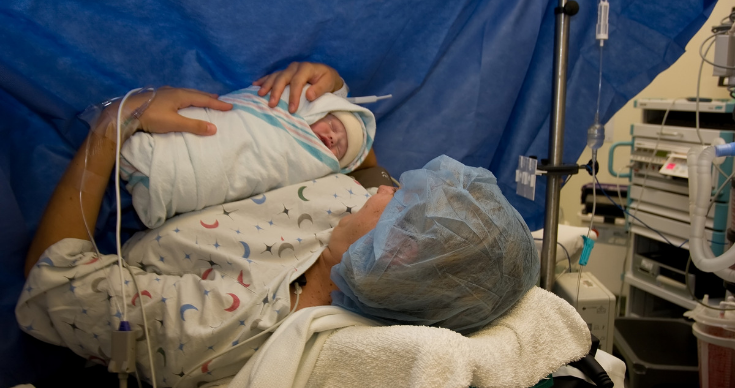
The Special Case Of Painless Delivery
You might have heard of a relatively new way of delivering baby, through ‘painless delivery’. It is carried out naturally, but with the administration of the epidural injection, that manages the pain significantly.
What Happens During C-Section
Cesarean section, or more commonly known as C-section is a comparatively newer method of childbirth. It is carried out by making an incision of length 4 to 6 inches across the lower abdomen and then on the uterus to pull the baby out. C-section can be done on both elective and emergency basis. Many a time, it is preferred and requested from the mother, when she does not want to strain herself due to labor or have long term complications such as urine incontinence, etc.
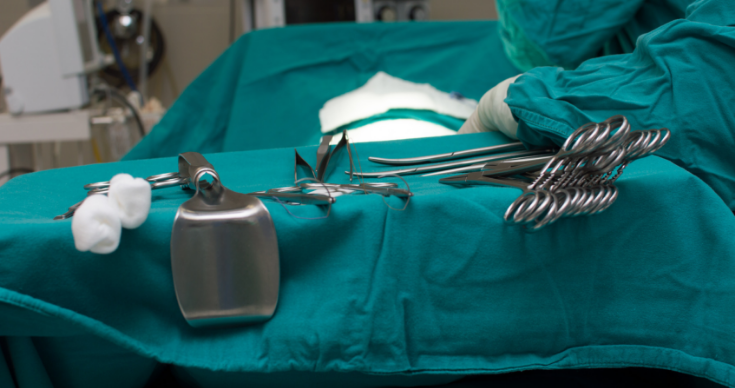
When C-Section Becomes Necessary?
As mentioned earlier, there are many reasons for opting C-section ( mainly due to medical reason). These are often diagnosed by the doctor during pregnancy or during the labor itself when the complication arises. These includes:
- The baby is larger than usual/ or the baby has a large head
- The mother has a small pelvis
- The baby is lying in head-up position (i.e breech baby)
- Twins sharing a same amniotic sac
- The mother is unable to deliver naturally
- The mother is exhausted due to strained labor
Which One Is Better For Me
Honestly, there is no particular answer for the same. For normal pregnancy without any complication, a mother can go for a natural birth, if she thinks it is best. But in case she does not want to strain herself or have any medical complications associated with it, C-section is a preferred approach. In either case, it is advised for every parents-to-be to stay prepared for both approaches.
ILS Hospitals offers both natural and C-section delivery. Get in touch with our expert Gynecologist and Obstetricians to determine which is best for you.
All You Need To Know About Stroke
A medical emergency can happen any day, any time, with or without any warning signs. The most common medical emergencies in Kolkata are a heart attack, stroke, cardiac arrest and road accidents. Often people assume heart attack and stroke to be the same thing, but they are not. Let’s understand some crucial aspects of stroke in brief.
What Is a Stroke?
Stroke is a medical emergency which occurs when blood flow to the brain stops and as a result, the brain cells begin to die. A heart attack is a similar medical emergency in which the supply of blood to the heart stops.
There are 3 kinds of stroke, namely
- Ischemic Stroke – When an artery is blocked
- Hemorrhagic Stroke – When a blood vessel is ruptured
- Mini Stroke (Transient Ischemic Attack) – When a blood vessel is damaged temporarily
Though a mini-stroke doesn’t have any long term effect on health for most people, some patients are left with some disability for life. A mini-stroke also uplifts the risks of having a stroke in the future, significantly.
What Are The Symptoms Of A Stroke?
As already mentioned, stroke is a medical emergency and during stroke every second count. Thus it is crucial to be able to identify stroke on time. But identifying stroke can be challenging for people in general. In this regard, we all should be aware of a simple acronym FAST. So, if you suspect anyone to have a stroke, check the following.
- Face Dropping – Ask them to smile to check the facial muscles. If you observe one side of the face to be dropping or if the smile appears to be uneven, it might indicate a stroke.
- Arm Weakness – Ask them to lift both arms and see if they can. Also, check if they complain of numbness in one arm.
- Speech Difficulty – Ask them to check how they respond and see if their speech seems slur or abnormal or if they are able to understand your command.
- Time To Call Ambulance – If any of the above-mentioned symptoms are present, don’t hesitate and call the ambulance immediately.
Apart from these obvious symptoms of a stroke, there are few other minor symptoms as well. These include-
- Severe, sudden headaches
- Blurry vision or difficulty focusing on one/both eyes
- Paralysis/numbness/weakness in body part/s
- Trouble walking or loss of balance
- Dizziness or confusion
- Loss of memory
- Muscle stiffness
- Involuntary eye movement
So, always remember, ‘if you suspect a stroke, then be FAST’. If you are not entirely sure, get it addressed at the nearby healthcare provider. Treatment on the right time will reduce the risk of disability or even death.
The symptoms of stroke may vary depending upon severity. On one hand mild stroke might have a temporary weakness; on the other hand, any sever stroke can end up causing permanent paralysis.
ILS Hospitals is all set to offer accurate diagnostics and prompt treatment for stroke and other medical emergencies. Our expert doctor and paramedic team monitor the patient round the clock, on our ICUs. For more information, visit us.
A Brief Introduction To Cardiac Catheterization
The heart is a wonderful organ that performs the crucial function of pumping blood into the body. Sometimes it happens that the functions of the heart get affected due to some illness or defect. Then it requires extensive treatment and accurate diagnosis, which plays an important role in keeping it healthy. Thus, today, we will discuss one particular diagnostic procedure, the cardiac catheterization.
What Is Cardiac Catheterization?
Cardiac catheterization is a diagnostic procedure that is available in many good heart hospitals, to evaluate the working condition of the heart. It can also evaluate the condition of the heart muscle, valves and the coronary arteries along with the pressure and oxygen level of the blood within the arteries. It can also locate the regions where the arteries get narrowed and can also detect birth defects in the heart if any. Moreover, it can collect some tissues from the heart, as a sample for biopsy.
The procedure is carried out in a cardiac catheterization lab or more commonly known as the cath lab. It helps the doctors identify the problems that are present within the heart or its arteries. It also can be used to unclog the blocked arteries.
Medical Procedures That Can Be Done During Cardiac Catheterization?
Several medical procedures can be carried out simultaneously by a cardiologist, during a session of cardiac catheterization. These include a range of procedure to fix a blockage in the heart such as coronary angioplasty, coronary stenting, balloon angioplasty. It is also used to fix any holes present in the heart structure along with repairing /replacing any valve. Procedures like ablation to treat arrhythmia can also be carried out with it.
How Is It Carried Out?
This is a non -invasive diagnostic technique, even though we have mentioned the catheters is pushed through the blood vessel. It is said so because the incisions are not made on or near the heart muscle. A thin, hollow cannula, known as the catheter is inserted through either an artery or vein. Usually, the site for this is the groin, arm or neck. It is then inserted further to reach the heart. This movement is tracked through the x-ray machine that is simultaneously used during cardiac catheterization.
Once the procedure is finished, the catheter and their equipment are retracted back and the incision is stitched closed.
Usually, the procedure is done while the patient is still awake, but they are given some sedatives to help them manage the pain. However, for procedures like valve repairs, and ablation, general anesthesia is administrated. The procedure mostly does not have any complications. Moreover, the recovery is quite fast and thus the patients can return to their home the same day. But, they might be kept under observation for a couple of more days, if the doctors find it necessary. Moreover, there is rarely any chance of developing any long term complication from it.
ILS Hospitals Dum Dum offers advance cath lab services. In case you have been referred to have cardiac catheterization, come straight to ILS Hospitals, one of the best heart hospitals in Kolkata, and get the best treatment from there, by the expert cardiologists.
Why Women Are More Prone To Osteoporosis
There are many factors that make an individual susceptible to any particular disease. Often such factors can be smoking, drinking alcohol, aging, having some underlying illness and so on. As per many orthopedic experts, women are more susceptible than men, when it comes to osteoporosis. Let’s find out the reasons why women are more likely to have osteoporosis than men.
Osteoporosis is an orthopedic condition in which the bone becomes porous. As a result, eventually, it leads towards making them weak and brittle. It can easily lead to a fracture even due minor to mild trauma or accident.
There are mainly 2 reasons for women being more susceptible to have osteoporosis.
Bone Structure
Osteoporosis often happens due to certain factors that are prominent during childhood and adolescence. Women reach their peak of bone mass growth around age 18, for men it continues to grow around the age of 20. Moreover, women have smaller bone structure as compared to men, as a result, their bone mass density is lower than that of men. These factors make women more susceptible to have orthopedic conditions.
Role Of Estrogen
The female hormone, estrogen is the main reason for the likelihood of osteoporosis in women. Estrogen keeps the fertility cycles in check. Simultaneously, it also keeps the bones healthy and strong and things work well until the time of menopause. After menopause, the hormonal level drops significantly and act as a big factor to cause low bone density.
The reason being, women keep on losing bone density after menopause. In fact, as per gynecologists, women who have menopause at a younger age are at even more risk of the same. In contrast, women having their cycles at an earlier age or the ones using contraceptive (with estrogen) often have healthier bone mass.
Moreover, having irregular periods or start having them at a much later age are also some reasons for lower bone mass than others. Apart from these, having the ovaries removed can also cause lower bone mass.
Thus it can be concluded that women are at higher risk of developing osteoporosis and often other orthopedic conditions as well. As per studies, it has been found that one out of every 2 women above the age of 50 is likely to have osteoporosis. However, that does not mean, nothing can be done to address it. Regular exercise, intaking adequate vitamin D and calcium are highly beneficial to ensure a strong bone build-up. Osteoporosis is a disease that requires timely treatment to make sure it does not result in any severe complication.
At ILS Hospitals, we offer excellent orthopedic treatment and care for people who are enduring pain and discomfort for years. It’s time to address them effectively and lead a much healthier life ahead.
Common Gynecological Problems Faced by Women of Different Age Groups
Aging is a natural progression for both men and women and it helps them acquire new experience and expertise. However, it also brings new challenges to health-wise. Today, we are going to discuss what gynecological problems women go through, at different phases of life.
Gynecological Problems During Adolescence
1. Delayed Puberty
There is no fixed to start having periods, but if it does not starts by the age of 11, it is best to seek a doctor. Though many young girls start having a period at the age of 14 or so, lack of periods can also happen due to the absence of uterus, by birth. An expert gynecologist can verify the same and advice accordingly.
2. Menstrual Disorder
There can be several types of issues with the menstrual cycle. Heavy periods, scanty periods and irregular periods are most common. Mostly it can be addressed well with a healthy diet, active lifestyle and taking adequate rest in between. However, it is still best to keep track of it and seek consultation from a gynecologist.
3. White Discharge
Though white discharge is very common among women of childbearing age, it can be a bit heavy and troublesome for young girls. Maintaining proper hygiene is required, along with doctor’s advice, if needed.
4. Abnormal Facial Hair
During a young age, many young girls develop facial hair due to hormonal disbalance, which can be devastating for her self-image. Often it gets better with age, but still, it is wise to seek an expert opinion, cause many a time, it does require treatment to fix it.
Gynecological Problems During Adult Age
1. Infertility
The inability to have a successful natural conception or to carry a pregnancy is termed as infertility. Often it is due to some lifestyle factor such as smoking, overweight which can be resolved. However, infertility often occurs due to some more severe hormonal or gynecological conditions, which requires extensive fertility treatment from expert doctors.
2. PCOS
Polycystic Ovary Syndrome (PCOS) is one of the most common hormonal issues among women of childbearing age. It becomes more prominent and problematic during this phase. It starts to interfere with everyday life and other gynecological aspects of the body. Thankfully, it can be treated effectively with medication, lifestyle change, and surgery, if required.
Read more: 5 Facts About PCOS Every Women Should Be Aware Of
Gynecological Problems During Later Age
1. Menopause
It is the natural decline and eventually cessation of reproductive life. Though it is inevitable for every woman, it brings a hard time for many women, either physically, or emotionally, or both. It can be easily treated and thus, women should consider it if they feel they need help.
2. Gynecological Cancer
Gynecological cancers are yet another problem among older age grouped women. Cancer of Breasts & Uterus is more commonly diagnosed in older women as compared to the younger groups. Often it is due to aging and sadly, many a time, it is because of ignoring symptoms of the same for years. Either way, it should be treated form an expert gynecologist or oncologist at the earliest.
All the women are advised to keep track of their health routine, especially after attaining puberty. Availing well-women health check-up package once every 2-3 years is an excellent way of ensuring the same. Seek medical help if any alarming symptoms appear. Stay healthy, and always remember-
“There is a pain in being a woman, yes, but there is pride in it, too”.
-Mary Pauline Lowry
Most Common Diabetic Foot Conditions You All Need To Know About
Diabetes is one of the most widespread diseases in today’s world. Diabetes clinics, all around the world are addressing hundreds of new diabetes patients each year and the number is rising at an alarming rate. Needless to say, having a timely diabetes treatment is quite crucial, as many of you must be aware that untreated (or poorly managed) diabetes can lead to many complications like damage to eyes, kidneys, skin, nerves along with causing cardiovascular conditions and hindrance in the natural healing process. Today, we are going to discuss one particular condition, the diabetic foot.
Diabetic foot is an umbrella term for the foot conditions that arise due to prolonged diabetes. Let’s list out some of the most common conditions related to the foot that is caused by diabetes.
Diabetic Neuropathy
This causes numbness and loss of sensation in the feet, particularly in the extremities. Eventually, it leads to nerve damage and makes the person unaware of having wounds, infections, irritation, blisters or sore in their feet. Often it happens, that people become unaware of the facts that they are wearing tight shoes or if the shoes are rubbing.
It left unaddressed for long, it leads towards having gangrene and ends up needing an amputation.
Peripheral Vascular Disease
Prolonged diabetes affects the structure and function of the blood vessels. In peripheral vascular disease, the fat starts to get decomposed on the blood vessels reaching hands and feet. As a result, the adequate blood supply to the feet gets hampered and results in pain and infections. If left unresolved, it too can lead to foot amputation in the future.
Athlete’s Foot
It is a fungal infection that leads to cracking of foot skin while making it red and itchy as well. If left untreated, germs can enter through the crack skin and spread infection. Thankfully, it can be easily treated with topical creams and oral medicines.
Foot Calluses
It is the hard skin build upon the underside of the foot. It often occurs due to uneven bodyweight distribution, poorly fitted footwear, prolonged diabetes or some underlying skin condition. Wearing footwear with padding and using a pumice stone to remove calluses regularly is a big help. However, one can consider taking medicine to address it effectively as well.
Foot Corn
It is a hard skin build-up either between toes or on a bony area of the underfoot. It may also happen due to uneven pressure distribution on the foot. It happens mostly on dry skin, due to friction between toes or because of the shoe. Using any sharp object to remove them forcefully is highly unadvised. Instead, proper medication is more useful for the same.
Diabetic Foot Ulcers
Diabetes makes the healing process quite slow, and any cut or injury in the foot can often lead to infection. Diabetic foot ulcers are the condition in which the skin breaks deep on the underfoot. It eventually scrapes out the flesh and if left untreated for long, it keeps on causing damage heavily to the foot.
In case you are suffering from diabetes for a long period and encountering some foot condition, get in touch with our expert diabetic foot specialist to get quality treatment and care.
Watch Out For These Monsoon-Related Health Issues And Few Precautions
The rain is pouring all around us. Sometimes, it is drizzling while sometimes it is raining hard. Though monsoon beings many joys, it also brings many health hazards. Many gastroenterology clinics note a rise in digestive illness around this time. It is not uncommon for people to have more sick leaves during this period of time. In fact, a sharp increase in patients can be seen in every best hospital during monsoon. Today, we will list out the most common monsoon-related health conditions and will offer some precautions to stay healthy during this season as well.
The best hospitals in Kolkata keeps on having a long queue of patients, all year round, but the following conditions are noted mostly during monsoon.
- Water-Borne Disease – The contamination of water with several pathogens leads to many bowel-related diseases namely, loose motion, diarrhea, cholera.
- Contaminated Food Related diseases – Due to the environment and hygienic factors, several diseases onset during monsoon, namely, stomach infections, vomiting, jaundice and so on.
- Mosquito-Borne Diseases – Since breeding of mosquito uplifts during monsoon season, several diseases like dengue, Chikungunya, Malaria, etc occur in large numbers.
- Common Monsoon Related Diseases – The season change of monsoon brings many other health conditions as well, such as common flu, fever, cold and cough. But thankfully, most of them can be easily treated with mild medication and taking adequate rest.
This season brings many health hazards but timely precaution can help you mitigate the risks of the same and enjoy the season.
1. Intake Plenty Of Vitamin C
Nature offers us many wonders in forms of fruits and vegetables that help us stay healthy. So, increase your intake of vitamin C during monsoon. It can be easily ensured by including citrus fruits in your diet, such as lemon, grapefruit, oranges and fresh green veggies; in fact, sprouts are a good option too.
2. Don’t Let Water Be Stagnant
As already mentioned before, lots of diseases occur due to mosquito during this season and stagnant water is highly favorable for them to breed on. So, make sure all the water storage tanks and reservoirs in your locality is carefully closed with lids and also make sure to get rid of any discarded objects that can store rainwater in it.
3. Avoid Street Food
No matter how mouthwatering you find street food to be, avoid it as much as you can, especially during monsoon. Avoid cut fruits, deep-fried things and items like panipuri in particular. It stays exposed out in the open and as a result, is highly likely to cause some or the other disease.
4. Disinfectant Yourself And Your Surrounding
During the monsoon, the germs spread rapidly. Thus, wash your hand before eating, add few drops of antiseptic or disinfectant in your bathing water daily. And also remember to wash your clothes and bedsheets with it too. You can spray some disinfectant near your home and garden as well.
5. Stay Covered Properly
Since the number of mosquitoes and other pathogens are more during monsoon, it is crucial to limit your exposure to them. Wear full sleeve clothes and pants to protect your skin against them. Also, try to use the mosquito net at night or have net installed at windows.
So, adopt these healthy habits to stay disease-free on this monsoon. However, if you come across any medical issues that persist for more than 5-7 days, get in touch with physicians for treatment and rule out the possibility of any health hazard.











